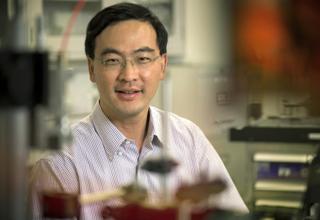Feb 5 2015
A University of Texas at Arlington researcher will use an Army Research Office grant to purchase a micro-optics assembly and characterization system that will usher in more intricate nanoscale-related research and manufacturing in the College of Engineering.
 Weidong Zhou, UT Arlington electrical engineering professor, received an Army Research Office grant that will allow the University to complete more intricate nano-scale research and manufacturing. (Credit: UT Arlington)
Weidong Zhou, UT Arlington electrical engineering professor, received an Army Research Office grant that will allow the University to complete more intricate nano-scale research and manufacturing. (Credit: UT Arlington)
Weidong Zhou, an electrical engineering professor who specializes in nanophotonic devices and nanotechnology manufacturing, is the principal investigator on the $298,770 grant.
"We need the piece of equipment to be more accurate in our projects and assemblies related to nanoscale dimensions," Zhou said. "The next big frontier is integrating electronic devices like circuit boards with nanotechnology and photonics to increase capacity and speed, and eventually reduce cost. This equipment helps us do that."
He said equipment like this system also helps attracts the best and brightest students to the nanotechnology and nanophotonics fields.
The grant is part of the Army Research Office's Research and Education Program for Historically Black Colleges and Universities and Minority-Serving Institutions. UT Arlington became a Hispanic-Serving Institution last year by meeting all U.S. Department of Education requirements set out for that designation.
The status makes the University eligible for federal grants supporting and strengthening institutions with large numbers of Hispanic students.
UT Arlington is the highest-profile public research university in North Texas to receive the designation and one of about 300 nationally.
Khosrow Behbehani, dean of the College of Engineering, said the instrument would allow UT Arlington to not only conduct research but perform nano-manufacturing tasks as well.
"It will help Dr. Zhou and his colleagues teach students skills they'll need in the photonics and nano-manufacturing sectors," Behbehani said. "There are a number of real-world applications in which this tool could be and is being used, including, nanotechnology, nano- and biophotonics, gas sensing and others."
Yuze (Alice) Sun, assistant professor in electrical engineering, is co-principal investigator on the project. This instrument will also enhance the fabrication and assembly capabilities for her research in studying the nanoscale gas sensing and separations, a project currently funded by the National Science Foundation.